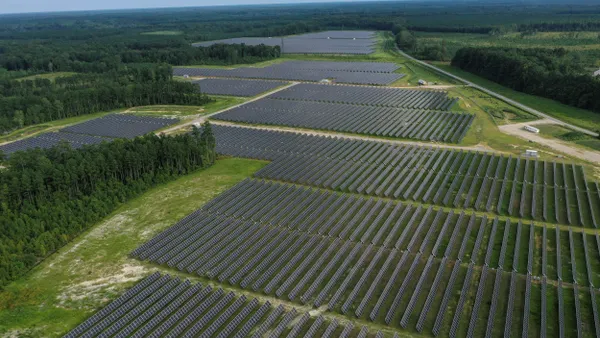Dive Brief:
- Salt River Project will purchase the energy produced by a new 50 MW solar facility developed by Apple, in Pinal County, east of its data center in Mesa, Arizona.
- SRP's Board of Directors has approved the deal, according to a statement. SRP and Apple worked together to locate a data center in the East Valley area two years ago, with SRP developing necessary tie-ins for the facility.
- Under the 25-year Purchase Power Agreement, the energy will be purchased by SRP at a wholesale rate and Apple will retain all of the environmental credits from the plant.
Dive Insight:
This most recent collaboration highlights Apple's commitment to 100% renewables, and its new role as an energy supplier.
Utility officials say they are committed to working with Apple and other customers on renewables development, including solar and geothermal, while keeping costs down. “This opportunity is not only economical, but a powerful demonstration of how SRP can be a catalyst for economic development in the Valley," SRP General Manager and CEO Mark Bonsall said in a statement.
SRP said it was part of a team that worked with Apple to locate in Arizona's East Valley in 2014, and later built an interconnection near the facility to help facilitate the construction of the Bonnybrooke PV solar plant. Apple has completed construction, and is now commissioning of the large-scale solar array.
Last month, the Federal Energy Regulatory Commission granted Apple market-based rate authority, giving it the right to sell excess power into the grid. It is a growing trend around large corporations, particularly forward-thinking tech companies. In 2010, federal regulators granted Google market-based rate authority.
SRP serves more than 1 million customers around the Phoenix area, and will use the output from Apple's solar array to lower its carbon footprint in the region.
Debates over the state's net metering policy last year put SRP in the national spotlight, more so when the utility added demand charges and fixed fees on rooftop solar users. Solar advocates subsequently questioned SRP's commitment to renewable energy. But SRP argued that distributed solar users were not paying their fair share for grid upkeep.














